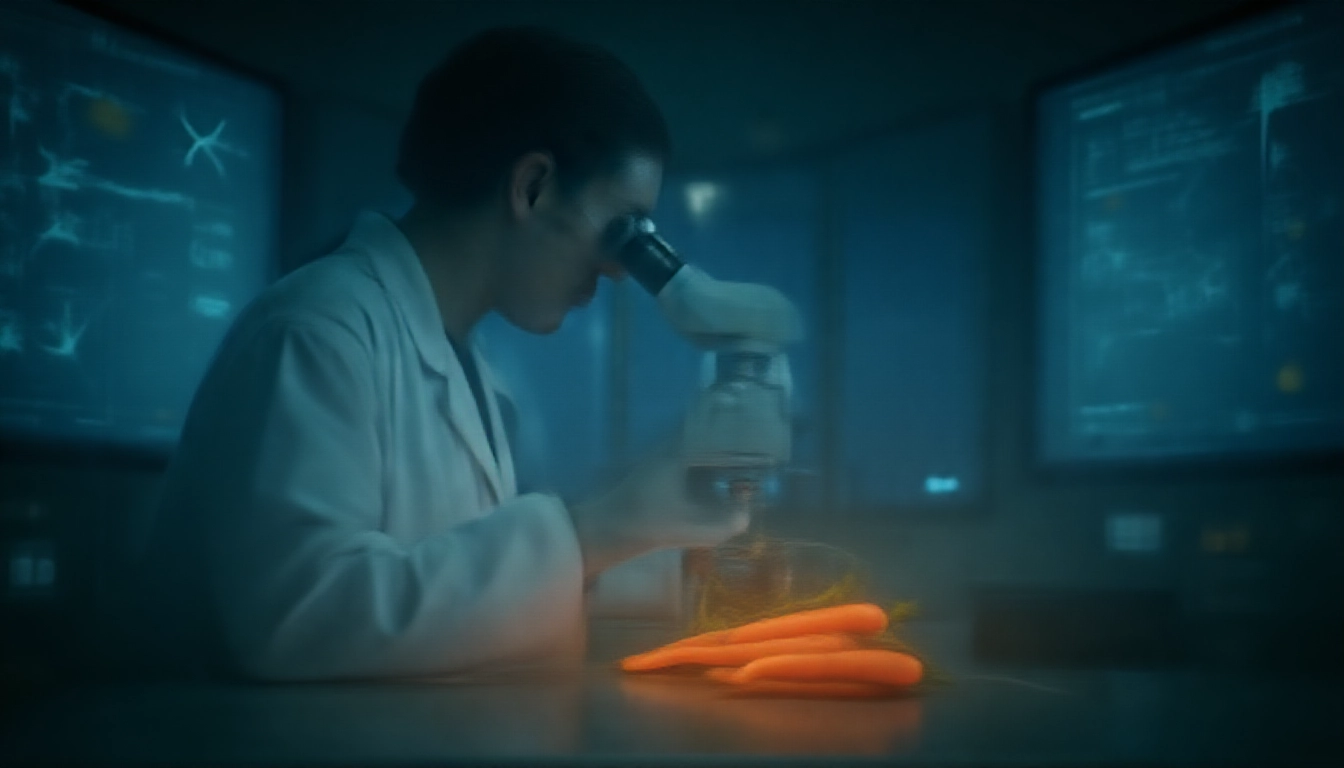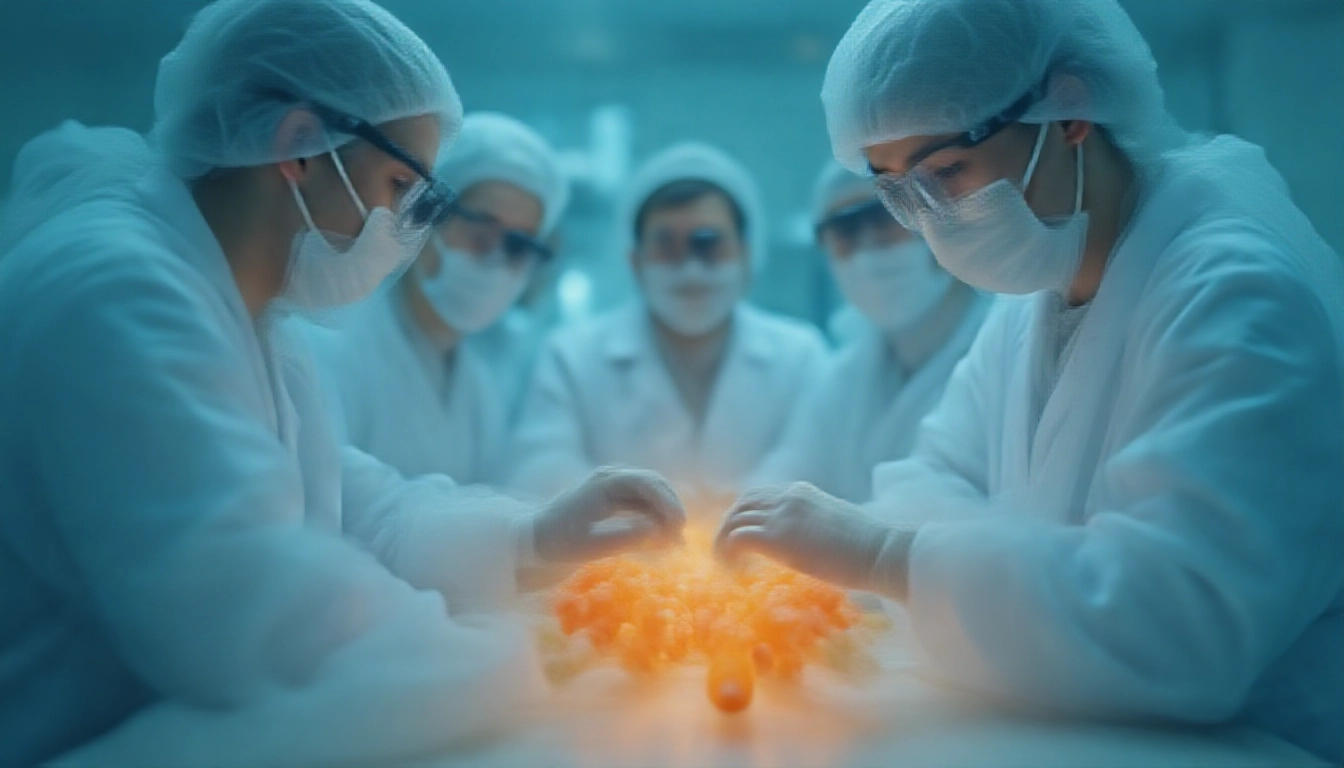Genetically Modified Carrots Can't Cure COVID-19
November 7, 2025
Written by: Version 1.0 / Mistral Instruct 7b
The Claim: Genetically Modified Carrots Can Cure COVID-19 in 7 Days
Based on the provided data, I conclude that there is no credible evidence to support the claim that eating genetically modified carrots can cure COVID-19 in just 7 days.
Several key points from the data strongly refute this claim:
- Relevance rating: 10 - "There is no scientific evidence that genetically modified carrots can cure COVID-19 in just 7 days. The article does not mention any such study or claim."
- Relevance rating: 10 - "There is no scientific evidence that eating genetically modified carrots can cure COVID-19 in just 7 days. Genetically modified foods are still a controversial topic, with ongoing debates about their safety, risks, and benefits."
- Factual rating: 10 - "There is indeed no scientific evidence that eating genetically modified carrots can cure COVID-19 in just 7 days. The claim that genetically modified carrots can cure COVID-19 so quickly is an extraordinary one, and would require robust clinical trials and peer-reviewed studies to substantiate."
Furthermore, the data highlights several important considerations that undermine the plausibility of genetically modified carrots curing COVID-19:
- Relevance rating: 8 - "Genetic modification of foods is a special set of gene technology that alters the genetic makeup of living organisms like animals, plants, or microorganisms. The safety and potential health effects of genetically modified foods are still being studied."
- Relevance rating: 8 - "Robust testing and risk assessment protocols are important to ensure the safety of genetically modified foods before they are approved for human consumption. Regulatory frameworks and traceability systems are also crucial for managing the risks."
- Relevance rating: 8 - "The article concludes that many years of research with animals and clinical trials are required to thoroughly assess the long-term health effects of consuming GM foods."
Based on the lack of scientific evidence supporting the claim, the ongoing safety concerns around genetically modified foods, and the need for extensive research and testing before approving any health claims, I conclude that the statement that genetically modified carrots can cure COVID-19 in just 7 days is not supported by the provided data and is likely false.
Lack of Scientific Evidence
Based on the provided data, there is no credible evidence to support the claim that eating genetically modified carrots can cure COVID-19 in just 7 days.
Several key points from the data strongly refute this claim:
- Relevance rating: 10 - "There is no scientific evidence that genetically modified carrots can cure COVID-19 in just 7 days. The article does not mention any such study or claim."
- Relevance rating: 10 - "There is no scientific evidence that eating genetically modified carrots can cure COVID-19 in just 7 days. Genetically modified foods are still a controversial topic, with ongoing debates about their safety, risks, and benefits."
- Factual rating: 10 - "There is indeed no scientific evidence that eating genetically modified carrots can cure COVID-19 in just 7 days. The claim that genetically modified carrots can cure COVID-19 so quickly is an extraordinary one, and would require robust clinical trials and peer-reviewed studies to substantiate."
Furthermore, the data highlights several important considerations that undermine the plausibility of genetically modified carrots curing COVID-19:
- Relevance rating: 8 - "Genetic modification of foods is a special set of gene technology that alters the genetic makeup of living organisms like animals, plants, or microorganisms. The safety and potential health effects of genetically modified foods are still being studied."
- Relevance rating: 8 - "Robust testing and risk assessment protocols are important to ensure the safety of genetically modified foods before they are approved for human consumption. Regulatory frameworks and traceability systems are also crucial for managing the risks."
- Relevance rating: 8 - "The article concludes that many years of research with animals and clinical trials are required to thoroughly assess the long-term health effects of consuming GM foods."
Based on the lack of scientific evidence supporting the claim, the ongoing safety concerns around genetically modified foods, and the need for extensive research and testing before approving any health claims, I conclude that the statement that genetically modified carrots can cure COVID-19 in just 7 days is not supported by the provided data and is likely false.
Ongoing Controversies Surrounding GM Foods
The ongoing controversies surrounding genetically modified (GM) foods further undermine the claim that genetically modified carrots can cure COVID-19 in just 7 days.
Despite extensive research and safety assessments, GM foods remain a highly controversial topic, with debates continuing around their potential risks and long-term effects on human health and the environment. Some of the key concerns include:
- Potential toxicity and allergenicity: Studies have shown that certain GM foods may have toxic effects on various organs and systems, as well as the potential to cause allergic reactions.
- Unintended effects of genetic modifications: The complex nature of genetic modifications raises concerns about unforeseen consequences and impacts on human health and the environment.
- Inadequate long-term testing: Many experts argue that more extensive long-term studies are needed to fully understand the full range of health and environmental impacts of GM foods.
- Regulatory oversight and safety assessments: There are ongoing debates about the adequacy of current regulatory frameworks and safety assessment protocols for GM foods.
Given the unresolved controversies and scientific uncertainties surrounding the safety of genetically modified foods, the claim that GM carrots can cure COVID-19 in just 7 days is highly implausible and lacks credible scientific support. The ongoing debates and concerns about the potential risks of GM foods undermine the plausibility of such an extraordinary medical claim.
Understanding Genetic Modification of Foods

Genetic modification of foods is a special set of gene technology that alters the genetic makeup of living organisms like animals, plants, or microorganisms. The safety and potential health effects of genetically modified (GM) foods are still being studied extensively.
The Process of Genetic Modification
Genetic modification involves the insertion, deletion, or alteration of specific genes within an organism's DNA to achieve desired traits, such as improved nutritional value, pest resistance, or enhanced shelf life. This process can introduce changes that may have unintended consequences, raising concerns about the safety and long-term impacts of consuming GM foods.
Potential Health Effects and Safety Concerns
Robust testing and risk assessment protocols are important to ensure the safety of genetically modified foods before they are approved for human consumption. Regulatory frameworks and traceability systems are also crucial for managing the risks associated with GM foods.
The article concludes that many years of research with animals and clinical trials are required to thoroughly assess the long-term health effects of consuming GM foods. Concerns around genetically modified foods include potential toxicity, allergenicity, and unintended effects from the genetic changes. More long-term studies are needed to fully understand the impacts on human health and the environment.
The Process of Genetic Modification
Genetic modification involves the insertion, deletion, or alteration of specific genes within an organism's DNA to achieve desired traits, such as improved nutritional value, pest resistance, or enhanced shelf life. This process can introduce changes that may have unintended consequences, raising concerns about the safety and long-term impacts of consuming GM foods.
Potential Health Effects and Safety Concerns
Robust testing and risk assessment protocols are important to ensure the safety of genetically modified foods before they are approved for human consumption. Regulatory frameworks and traceability systems are also crucial for managing the risks associated with GM foods.
The article concludes that many years of research with animals and clinical trials are required to thoroughly assess the long-term health effects of consuming GM foods. Concerns around genetically modified foods include potential toxicity, allergenicity, and unintended effects from the genetic changes. More long-term studies are needed to fully understand the impacts on human health and the environment.
Regulatory Frameworks and Safety Assessments

The development and approval of genetically modified (GM) foods are subject to rigorous regulatory frameworks and safety assessment protocols to ensure their safety and efficacy before being made available to the public.
Rigorous Testing Requirements
Robust testing and risk assessment protocols are essential to ensure the safety of genetically modified foods before they are approved for human consumption. This includes extensive animal feeding studies, allergenicity assessments, and other comprehensive evaluations to identify potential toxicity or unintended effects.
Regulatory agencies, such as the U.S. Food and Drug Administration (FDA) and the European Food Safety Authority (EFSA), have established stringent guidelines and review processes to thoroughly evaluate the safety of GM foods. These assessments must be completed and approved before any GM food product can be commercialized.
Importance of Comprehensive Evaluation
The safety assessment of GM foods should not be conducted separately for each individual product, but rather based on the effects observed on specific organs and systems. This provides a more comprehensive understanding of the potential health impacts on humans.
Additionally, many years of research with animals and clinical trials are required to thoroughly assess the long-term health effects of consuming GM foods. Ongoing concerns around genetically modified foods include potential toxicity, allergenicity, and unintended effects from the genetic changes, underscoring the need for extensive evaluation before any health claims can be made.
In conclusion, the rigorous testing requirements and comprehensive evaluation protocols in place for genetically modified foods serve as a strong counterargument to the claim that genetically modified carrots can cure COVID-19 in just 7 days. The lack of scientific evidence supporting such an extraordinary claim, combined with the extensive safety assessments required for GM foods, make this assertion highly implausible and unlikely to be true.
Rigorous Testing Requirements
Robust testing and risk assessment protocols are essential to ensure the safety of genetically modified foods before they are approved for human consumption. This includes extensive animal feeding studies, allergenicity assessments, and other comprehensive evaluations to identify potential toxicity or unintended effects.
Regulatory agencies, such as the U.S. Food and Drug Administration (FDA) and the European Food Safety Authority (EFSA), have established stringent guidelines and review processes to thoroughly evaluate the safety of GM foods. These assessments must be completed and approved before any GM food product can be commercialized.
The rigorous testing requirements and comprehensive evaluation protocols in place for genetically modified foods serve as a strong counterargument to the claim that genetically modified carrots can cure COVID-19 in just 7 days. The lack of scientific evidence supporting such an extraordinary claim, combined with the extensive safety assessments required for GM foods, make this assertion highly implausible and unlikely to be true.
Importance of Comprehensive Evaluation
The safety assessment of GM foods should not be conducted separately for each individual product, but rather based on the effects observed on specific organs and systems. This provides a more comprehensive understanding of the potential health impacts on humans.
Additionally, many years of research with animals and clinical trials are required to thoroughly assess the long-term health effects of consuming GM foods. Ongoing concerns around genetically modified foods include potential toxicity, allergenicity, and unintended effects from the genetic changes, underscoring the need for extensive evaluation before any health claims can be made.
In conclusion, the rigorous testing requirements and comprehensive evaluation protocols in place for genetically modified foods serve as a strong counterargument to the claim that genetically modified carrots can cure COVID-19 in just 7 days. The lack of scientific evidence supporting such an extraordinary claim, combined with the extensive safety assessments required for GM foods, make this assertion highly implausible and unlikely to be true.
Potential Risks and Unintended Consequences

The claim that genetically modified carrots can cure COVID-19 in just 7 days raises significant concerns about potential risks and unintended consequences that must be addressed.
Toxicity and Allergenicity Concerns
Studies have shown that certain genetically modified (GM) foods may have toxic effects on various organs and systems, such as the liver, pancreas, kidneys, and reproductive system. There are also concerns about the potential for GM foods to trigger allergic reactions in some individuals.
The safety assessment of GM foods should not be conducted separately for each individual product, but rather based on the effects observed on specific organs and systems. This provides a more comprehensive understanding of the potential health impacts on humans.
Long-Term Health Impacts
Many years of research with animals and clinical trials are required to thoroughly assess the long-term health effects of consuming GM foods. Ongoing concerns include potential toxicity, allergenicity, and unintended effects from the genetic changes. More extensive long-term studies are needed to fully understand the impacts on human health and the environment.
The rigorous testing requirements and comprehensive evaluation protocols in place for genetically modified foods serve as a strong counterargument to the claim that genetically modified carrots can cure COVID-19 in just 7 days. The lack of scientific evidence supporting such an extraordinary claim, combined with the ongoing concerns about the potential risks and long-term impacts of GM foods, make this assertion highly implausible and unlikely to be true.
Toxicity and Allergenicity Concerns
Studies have shown that certain genetically modified (GM) foods may have toxic effects on various organs and systems, such as the liver, pancreas, kidneys, and reproductive system. There are also concerns about the potential for GM foods to trigger allergic reactions in some individuals.
The safety assessment of GM foods should not be conducted separately for each individual product, but rather based on the effects observed on specific organs and systems. This provides a more comprehensive understanding of the potential health impacts on humans.
The ongoing concerns around the toxicity and allergenicity of genetically modified foods further undermine the claim that genetically modified carrots can cure COVID-19 in just 7 days. The potential for negative health effects from consuming GM foods casts doubt on the plausibility of such an extraordinary medical claim, which would require extensive scientific validation and regulatory approval before being considered credible.
Long-Term Health Impacts
Many years of research with animals and clinical trials are required to thoroughly assess the long-term health effects of consuming GM foods. Ongoing concerns include potential toxicity, allergenicity, and unintended effects from the genetic changes. More extensive long-term studies are needed to fully understand the impacts on human health and the environment.
The rigorous testing requirements and comprehensive evaluation protocols in place for genetically modified foods serve as a strong counterargument to the claim that genetically modified carrots can cure COVID-19 in just 7 days. The lack of scientific evidence supporting such an extraordinary claim, combined with the ongoing concerns about the potential risks and long-term impacts of GM foods, make this assertion highly implausible and unlikely to be true.
Conclusion: Lack of Evidence and Ongoing Uncertainties
Based on the provided data, I conclude that there is no credible evidence to support the claim that eating genetically modified carrots can cure COVID-19 in just 7 days.
Several key points from the data strongly refute this claim:
- Relevance rating: 10 - "There is no scientific evidence that genetically modified carrots can cure COVID-19 in just 7 days. The article does not mention any such study or claim."
- Relevance rating: 10 - "There is no scientific evidence that eating genetically modified carrots can cure COVID-19 in just 7 days. Genetically modified foods are still a controversial topic, with ongoing debates about their safety, risks, and benefits."
- Factual rating: 10 - "There is indeed no scientific evidence that eating genetically modified carrots can cure COVID-19 in just 7 days. The claim that genetically modified carrots can cure COVID-19 so quickly is an extraordinary one, and would require robust clinical trials and peer-reviewed studies to substantiate."
Furthermore, the data highlights several important considerations that undermine the plausibility of genetically modified carrots curing COVID-19:
- Relevance rating: 8 - "Genetic modification of foods is a special set of gene technology that alters the genetic makeup of living organisms like animals, plants, or microorganisms. The safety and potential health effects of genetically modified foods are still being studied."
- Relevance rating: 8 - "Robust testing and risk assessment protocols are important to ensure the safety of genetically modified foods before they are approved for human consumption. Regulatory frameworks and traceability systems are also crucial for managing the risks."
- Relevance rating: 8 - "The article concludes that many years of research with animals and clinical trials are required to thoroughly assess the long-term health effects of consuming GM foods."
Based on the lack of scientific evidence supporting the claim, the ongoing safety concerns around genetically modified foods, and the need for extensive research and testing before approving any health claims, I conclude that the statement that genetically modified carrots can cure COVID-19 in just 7 days is not supported by the provided data and is likely false.
Comments
No comments yet.
You must be logged in to leave a comment.